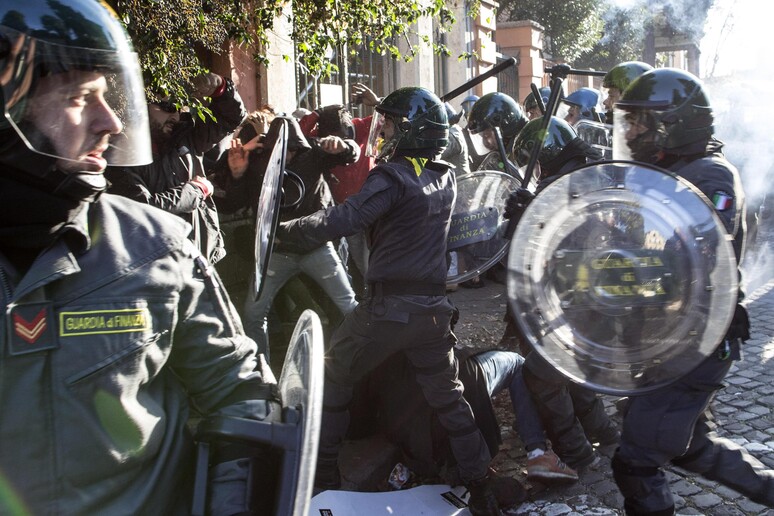Trade unions and student organisations mounted a large show of force to protest against the policies of Premier Matteo Renzi's government on Friday with a general strike and rallies throughout the recession-hit country.
The one-dau strike, called by two of Italy's three big trade union confederations, the CGIL and the UIL, was married by violence at protests in Milan and Turin.
At the same time, social housing activists clashed with police in riot gear at a piazza near a building in central Rome that had been occupied earlier by activists. Flares were thrown as police cleared the building.
Across the country, the strike and rallies against the government caused massive disruption, with public transport services badly affected.
Half of Italy's train services and flights and 70% of its bus services were halted on Friday, trade unions CGIL and UIL said in a statement. In Turin, police clashed with protestors who broke off from the main march and tried to break though a security cordon.
Police responded with a charge. Nine protestors were detained. In Milan, students set of flares and threw objects at the offices of the regional government and there were several incidents of vandalism.
Police with batons charged protestors. Six police officers and five Carabinieri were injured.
Organizers said over 50 rallies were taking place in cities nationwide to contest the government's controversial Jobs Act labour reform, which weakens protection for newly hired workers against unfair dismissal in a bid to encourage firms to take on staff and combat record unemployment levels.
Action has also been called to protest against the government's 2015 budget bill, which features 15 billion euros in spending cuts, plus 18 billion euros in tax cuts aimed at boosting the recession-hit economy.
UIL leader Carmelo Barbagallo said Friday that workers participating in the strike were demanding real change, not words. "We really want to change Italy, not in words," Barbagallo told a Rome rally of around 40,000 people. "They have to stop telling stories, making promises they don't keep, and they must give back dignity to workers, hope to the young and certainty to pensioners to survive the crisis".
He added that unions were ready to stage a "new resistance" against those who think they can be disposed with.
President Giorgio Napolitano said that Friday's strike was a sign of tension between trade unions and Renzi's government, adding that such friction was not good for the country. "The general strike called today is undoubtedly a significant (sign of) tension between the unions and the government," the head of State told reporters in Turin. "It's good for there to be reciprocal respect, not the bitterness that today is a sign of. It's not good for the country". Tension has been especially high in recent months between Renzi and Italy's largest trade-union confederation, the leftwing CGIL, particularly its metalworkers arm FIOM. CGIL leader Susanna Camusso has accused Renzi of not being open to dialogue, while Renzi has said the government does not have to negotiate with unions when it is making policy.
"If Renzi's message it keeping going straight, he should know that we'll keep going straight too," Camusso said in Turin.
Additional tension in the run-up to Friday's general strike was caused by Transport Minister Maurizio Lupi's decision to impose an injunction to prevent rail workers taking part.
Lupi reversed that decision late on Thursday.
Former Premier Massimo D'Alema said that the executive had to listen to demands of the masses of Italian workers taking part in the strike. "The situation is serious and I hope that the government listens to the calls from the streets and considers the requests of the workers," said D'Alema, a member of Renzi's centre-left Democratic Party (PD).
ALL RIGHTS RESERVED © Copyright ANSA











